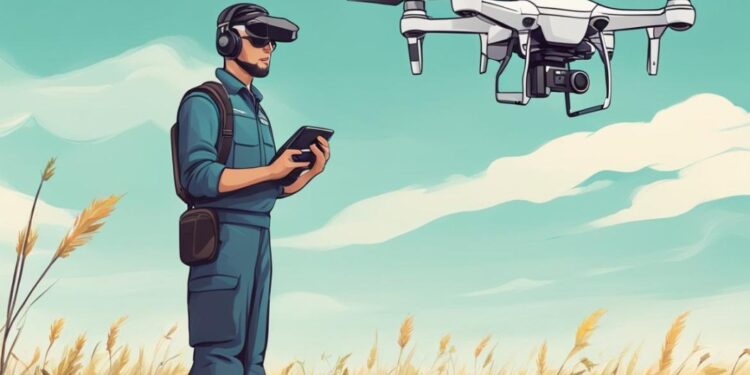During elementary school, my sons had fun flying a drone. When I spotted that affordable toy crash in our backyard, I figured their skills as drone operators didn’t necessitate any further enhancement.
Fast forward to 2024, and ZipRecruiter reports that the median annual salary for a drone pilot in the U.S. is $130,916. This is a substantial income for someone who doesn’t require advanced academic credentials or the need to conquer a tough examination.
With my eldest son set to graduate high school in 2026, I’m beginning to question whether I should have salvaged that downed drone from years past—pursuing a profession as a drone pilot now seems like a lucrative option.
Rapid Growth in Drone Utilization
The global demand for commercial drone pilots has surged recently, as noted by Flying magazine, and there appears to be no deceleration in sight. Despite many sectors scaling down, opportunities for drone pilots have proliferated as various industries adopt advancing technologies.
Estimates from Drone Industry Insights suggest that by 2030, the global drone market is expected to reach $54.6 billion.
Job prospects for drone operators are also on the rise. They can operate as independent freelancers, providing services to various clients, or secure full-time positions with corporations or government agencies.
ZipRecruiter highlights that the top three cities where drone pilot salaries exceed the national average are Mineral, Virginia; Carmel Valley, California; and Mercer Island, Washington.
Easy Path to Becoming a Drone Pilot
To become a certified remote pilot under the FAA’s Small UAS Rule (Part 107), you need to follow certain steps as outlined by the Federal Aviation Administration (FAA). These include obtaining a remote pilot certificate from the FAA, being at least 16 years old, being able to read, write, speak, and understand English, maintaining the physical and mental capability to fly a drone safely, and passing the initial aeronautical knowledge test.
Institutions such as Pilot Institute and Drone U provide both online and in-person training that teaches intermediate skills like drone operation and safety. They also offer advanced courses in areas like thermography, videography, and interactive modeling.
Drone schools assist students in preparing for their remote pilot certificate and the aeronautical knowledge exam while providing continual education and career guidance.
Drones Are Essential in Various Industries
Drones are versatile tools used widely, from capturing breathtaking aerial shots for movies and TV to monitoring vast farmland or managing surveying tasks.
Recent reports from Drone Industry Insights indicate that advanced applications of drones are rapidly diversifying across 17 sectors, with photography, filming, and specialized industrial applications on the rise, demonstrating a greater acceptance of drone technology.
Key Industries Hiring Drone Pilots and Their Key Responsibilities:
Real Estate: Research indicates that properties featuring aerial photography are significantly more likely to sell compared to those that lack it. This domain requires basic flying and photography expertise, with most roles focused on capturing aerial images and videos of properties to enhance listings.
Agriculture: Drones play a crucial role in precision farming and forestry. New drone operators can find opportunities in agriculture but may need some prior experience. Pilots focusing on this sector often possess in-depth agricultural or forestry knowledge, making it challenging for new licensees to break into the field.
Construction: Drones are commonly used to track construction progress, inspect buildings, and map large terrains. Pilots need to understand industrial inspections and construction processes, possess advanced flying skills, and be familiar with specific software and tools for data collection and integration.
Emergency Response: This demanding area for drone pilots involves the use of drones in search and rescue missions, disaster response, and law enforcement. Working in emergency response is often hazardous and can be mentally and emotionally taxing. Positions in law enforcement typically require extensive training, which can take months or even years.
Filmmaking: Drone operators can gather aerial footage for television and film projects, providing the chance to participate in producing shows and movies. Finding work in filmmaking may be more competitive compared to other sectors due to the higher level of photography expertise required, including knowledge of camera angles and cinematic techniques. This niche offers more creative prospects and could pave the way for careers in film production.
Energy: Drones provide safer and more efficient methods for companies in the energy industry, including oil, gas, and renewable energy. They facilitate tasks such as thermal imaging, environmental monitoring, surveying, and inspections, helping cut costs and broaden the operational reach for these key players.
Securing a Job as a Drone Pilot
Once you meet the FAA requirements to become a certified remote pilot and are prepared to explore job offerings, it’s vital to assess the market and the availability of positions in your region or in locations you wish to move to. Whether in construction, real estate, filmmaking, or agriculture, there is likely a demand for drone pilots and corresponding job openings.
As technology continues to evolve, the demand for drone pilots is destined to grow. By entering one of these expanding sectors, drone pilots can enjoy job security with reduced risks and improved financial prospects.


